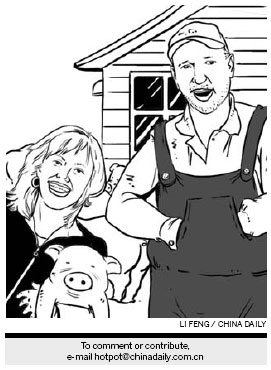View
Getting a taste of a farmer's life in the US Midwest
Updated: 2011-05-05 07:54
By Liu Jun (China Daily)
 |
A powerful stench filled my nostrils and a sudden warmth blurred my glasses. It took me a few minutes to see the scene clearly: A dozen or so pink piglets were oinking in a fenced-in cubicle about 3 by 5 meters. There seemed to be hundreds of these cubicles in this huge structure, with heating and food provided via pipes.
In his drab, mud-stained overalls, Brian Wilson climbed over a fence and picked up a pig, cradling it in his arms. He and his wife Nancy are raising 1,400 young hogs and 2,800 adult hogs on their farm, without any help.
This is amazing. My grandma and aunts in rural Chongqing raise one or two pigs and some rabbits on a field less than half of a basketball court each year. In rural China, land is scarce, labor is cheap and the kind of technology I see on this farm is simply not affordable.
Natasha, my colleague at the University of Iowa, drove me and a friend to her parents' farm on a snowy Saturday in early April to catch a glimpse - and get a taste - of a farmer's life in the US Midwest.
On my first day on campus, I asked Natasha if she was Russian. She looked like a classic beauty from that country. No, her family has been in the US for about 200 years, coming originally from Scotland and France. They've lived in the same old house at the 3.23 square kilometer farm since the Great Depression, in the 1930s.
 |
Once we took off our muddy shoes and spritzed fragrance over ourselves, our hostess Nancy proudly showed us around the house, which to my untrained eyes was just as elegant as the downtown houses in Iowa City, Iowa.
She had scrubbed off the old paint from the walnut railing to the second floor to reveal the original wood grain dating back to 1890. When we remodeled our apartment in Beijing, one such carved wooden rail cost 400 yuan ($61).
The neat bright rooms with computers, big TVs, spotless toilets, a big refrigerator with a built-in ice dispenser, were completely different from my grandparents' house. I trip in dim house built on uneven ground every time I visit them during Spring Festival.
Natasha's parents have remodeled the house several times to meet the growing demands of five children, all of whom were home-schooled until the ninth grade. Her youngest sister, 15, is still at home.
While most nearby farmers have sold their lands and work for rich owners of thousands of acres, Natasha says her parents prefer working their own farm.
A photo in their bedroom shows Nancy and Brian in a tuxedo and wedding gown. Decades of hard work have added a few wrinkles and pounds, but strength and wisdom made them look even more attractive.
Mr Wilson led the prayer before lunch, but didn't join us, along with the grandparents, for a candle-lit feast of salads, pork and cake. He had to fix more machinery for the busy spring season, when they'll be planting corn, soybeans and vegetables.
John and Corinne, both in their 80s, drove for 16 km through snow and rain from their seniors' home in Washington, Iowa, to meet us. The couple have hosted Chinese students after visiting Beijing and Xi'an in 1990, climbed the Great Wall and fell in love with Peking roast duck.
Corinne taught at the rural school for 28 years. They used to have a few cows. Nowadays, Brian and Nancy are making a living with the pigs, 20-odd chickens, five or so cows, five Labradors and three cats. "You don't grow fond of the animals unless they are your pets," John says. "But we treat them humanely, keep 'em fed 'n' warm."
There's no need for chemical fertilizer, as pig manure enriches the land. In turn, the corn is good feed for the cattle.
We took strawberry stems and asparagus leftovers to feed the chickens. Nothing from the dinner table was wasted. One of the two dozen eggs hidden in the hay was as big as a goose egg. Corinne said it must have two yolks.
The topic somehow returned to smells as we waved good-bye.
"We never noticed the smell until we moved to town. Back then, it was the smell of money," Corinne says.
China Daily
Specials

Sino-US Dialogue
China and the US hold the third round of the Strategic and Economic Dialogue from May 9-10 in Washington.

V-Day parade
A military parade marking the 66th anniversary of the Soviet victory over Nazi.

Revolutionary marriage
A newlywed couple sings revolutionary songs during their marriage.